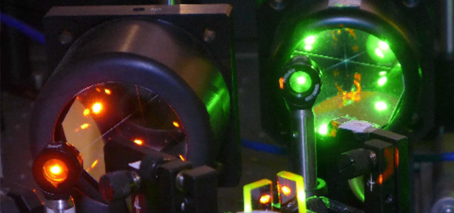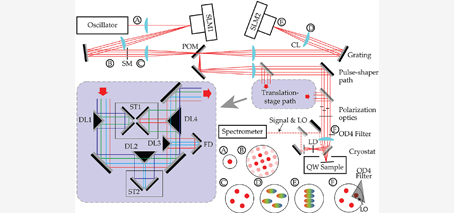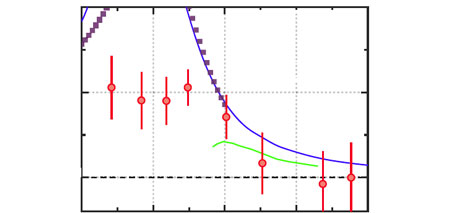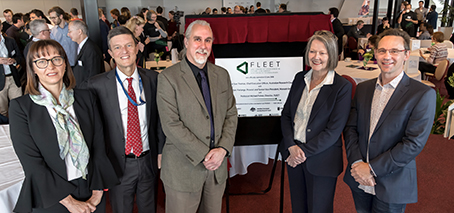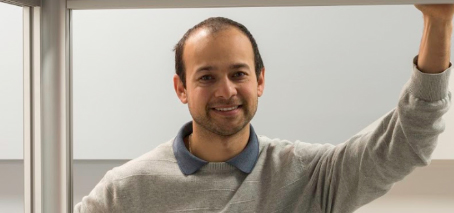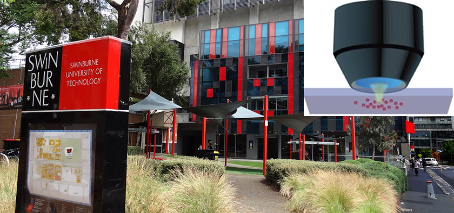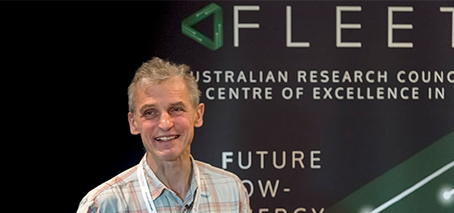Half of the 2018 Nobel Prize for Physics has been awarded to Gérard Mourou and Donna Strickland for their method of generating high-intensity, ultra-short optical pulses Ultra-fast laser physics key to development of future electronics The technique developed by Mourou and Strickland has had enormous impact across the fields of chemistry, physics and biology, and provides the basis for important …
Laser pulses quadrillionths of a second long probe electronic structure at Swinburne
Quantifying the dynamics and interactions of electronic systems is crucial for understanding the mechanisms that make them useful candidates for ultra-low energy electronics. We need to observe and measure the behaviour of electron interactions at a femtosecond scale (ie, at a few millionths of a billionth of a second). As a research tool, Optical Coherent Multidimensional Spectroscopy (CMDS) offers the …
Quantum anomaly – breaking a classical symmetry with ultracold atoms
Scaling symmetry in a 2D Fermi gas breaks down with strong interactions between particles Quantum gas studies unlock fundamental physics—with an immediate application A FLEET study of ultracold atomic gases – a billionth the temperature of outer space – unlocks new, fundamental quantum effects. The researchers at Swinburne University of Technology studied collective oscillations in ultracold atomic gases – identifying …
Launch of FLEET Centre of Excellence to tackle hidden energy costs of computing
Official launch: Australian Research Council Centre of Excellence in Future Low-Energy Electronics Technologies 12 June 2018, 11 AM New Horizons Building, Monash University, Clayton We have an insatiable appetite for computing. But our ongoing need for computation is burning more than 5 percent of global electricity. And that figure is expected to double each decade. A new Australian Research Council …
Carlos talks ultra-cold atoms and inspiring schoolkids to do science, RRR
FLEET postdoc Dr Carlos Kuhn described his field of ultra-cold atomic science and the fundamental discoveries made in an interview with RRR science show Einstein a Go-Go. The research will take a huge step forward this year with the commissioning of a new ARC-funded quantum-gas microscope, which will bridge the microscopic (atomic) and macroscopic (visible) worlds. Carlos also described his …
Single-atom manipulation at Swinburne with new, shared quantum-gas microscope
Bridge between microscopic and macroscopic behaviour A new quantum-gas microscope facility at Swinburne University of Technology will allow studies of ultra-cold atomic gases, giving researchers the ability to image and manipulate single atoms. The facility will allow study of quantum effects at a macroscopic scale: a major unsolved issue in physics. To harness the full potential of such quantum materials, …
Ultracold science and benefits of a changeable career in science: Wolfgang Ketterle
Physics experiments at temperatures a billionth of outer space, and the benefits of flexibility in a science career. Nobel physics laureate Prof Wolfgang Ketterle told a crowd of around 200 at Swinburne University of Technology last week about Bose-Einstein condensates (BECs), and other strange states of matter that exist at nano-Kelvin temperatures, which open a new door to the quantum …
Science Says! and other outreach collaborations
FLEET supported the first Melbourne show of Science Says!, a science entertainment event run by The Science Nation, with FLEET’s A/Prof Meera Parish (Monash University) and Prof Chris Vale (Swinburne University of Technology) appearing on the panel at the Royal Society of Victoria. FLEET collaborated with Swinburne University of Technology, Monash University School of Physics and Astronomy, and the Australian …
Wolfgang Ketterle introduces Red to new states: ABC Radio Melbourne
“That’s not right!” Well, yes, it is. Prof Wolfgang Ketterle, in Australia with FLEET, teaches ABC Radio Melbourne’s Red Symons a thing or two about states of matter. In particular, Bose Einstein condensates. Listen below. Ketterle, in town for FLEET’s inaugural annual workshop in Torquay, is visiting the ultra-cold atomic labs at Swinburne today, where FLEET researchers use Bose-Einstein condensates …
FLEET researchers get a $4.6m boost in ARC funding round
This month’s ARC funding round saw FLEET research and researchers across five universities awarded additional funding. Across eight separate grants, almost $4.6m new research funding went to projects and facilities led by or involving FLEET researchers or directly contributing to FLEET’s search to develop ultra-low energy electronics and boost related areas of research. Two projects in particular will be key …
Research in Light-Transformed Materials
FLEET researchers undertake various research projects in the area of Light-Transformed Materials. If you have a project that would fit this theme, find information about a potential supervisor here: PROF. KRIS HELMERSON Ultracold atomic gases Biophysics Biotechnology A/PROF. MEERA PARISH Theory of strongly correlated phenomena in ultracold atomic gases and electron systems Superconductivity and superfluidity Lowdimensional systems Magnetotransport DR. AGUSTIN …
- Page 2 of 2
- 1
- 2

